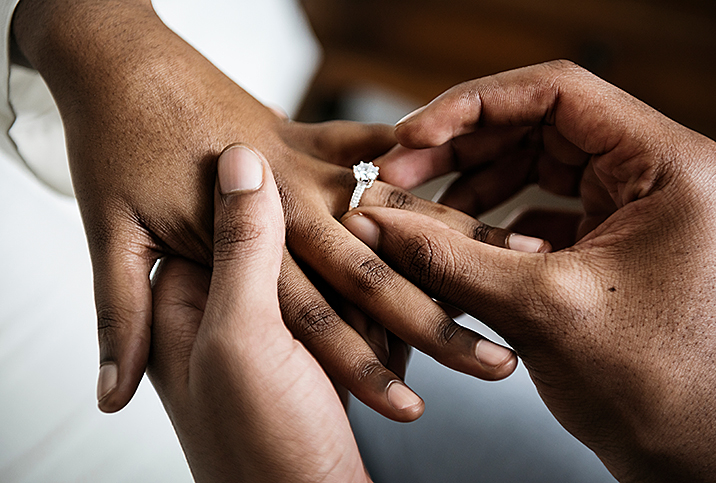Divorce Lawyers Weigh In on What Makes a Happy Marriage

Why do good things fall apart?
When it comes to marriage, few people are more uniquely qualified to answer this particular question than the lawyers and mediators who see divorce every working day. We spoke with them to understand why couples split and how to avoid the same fate.
The keys to a healthy, lasting relationship
"As a divorce lawyer, I have seen a number of trends in bad marriages that land people in my office," said Morghan Richardson, a partner of family law at Davidoff Hutcher & Citron, a law firm based in New York City. "Over the years, and thousands of divorces later, couples that I see crafting long-lasting divorce-proof relationships have several things in common.
"The first is communication skills," Richardson continued. "Always put your spouse first in developing a clear and consistent method of communicating, and let no one get in the way.
"The second is the ability to compromise. Life is about compromise, and so is love. This means figuring out solutions to problems that are best overall for both of you, not just one person. Finally, there's connection—making time to stay intimate and connected, and finding new ways to share that spark together."
Rachel Green, a divorce mediator at Resolutions Mediation & Collaborative Sys, LLC, in Brooklyn, New York, agreed, adding it's important to make your spouse and marriage a priority.
"Your spouse is your number-one person, and you should both treat each other that way," she said.
At times, I have been super angry with my husband about one thing or another—but in time, I have found that many irritations and aggravations will pass.
This means implementing the oft-cited Golden Rule and committing to the relationship fully. A lack of commitment is the most frequently claimed reason for divorce in the U.S., followed by infidelity and irreconcilable differences.
"Although I am a divorce mediator, in my own marriage, I act as though divorce doesn't exist," Green said. "At times, I have been super angry with my husband about one thing or another—but in time, I have found that many irritations and aggravations will pass. Work to forgive and to let go of irritations, and don't hold a grudge. At times, you will both irritate each other. Marriage vows should say, 'I promise to love, honor and annoy.'
"I like what RBG [Ruth Bader Ginsberg, former associate justice of the Supreme Court of the United States] said: 'To maintain a happy marriage, sometimes you want to be a little bit deaf,'" Green continued. "Don't grab every opportunity to fight. Let some of them slip by without responding."
In addition to letting go of the little things and treating the relationship as a team effort, to which both parties must actively, consistently contribute, Holly Davis, a founding partner at Kirker Davis LLP in Austin, Texas, said it's essential for individuals to respect their spouse and their autonomy.
"Realize that you don't own your spouse," she said. "If we gave up on the idea that marriage is a form of permanent ownership, it could lead to better behavior, including not taking your partner for granted and working on your own issues to become your best self."
What you should consider before getting hitched
Divorce prevention starts before vows are even exchanged. While everyone's criteria and preferences are different, there are a few factors everyone should consider before putting a ring on it, regardless of who or what you're into.
"My mother has an expression: 'You know on Saturday what your Sunday will be,'" said Sandra Radna, an attorney at Sandra Radna PC, based in Melville, New York. "In other words, there are often things that couples ignore prior to the marriage that end up being huge problems during the marriage."
Most importantly, experts advise pumping the brakes (or pulling to a screeching halt) if your partner exhibits harmful behaviors, such as anger management issues, or if they are dishonest, disrespectful or abusive. While counseling or rehabilitation might rectify some of these problems, experts say it's unrealistic and potentially unsafe to expect someone to change.
"Addictions, jealousy, secrecy about finances, their job or their life in general, are all red flags," Radna said. "The important thing to remember is that most people don't change. Expecting that things that you don't like about your future spouse will improve or get better during the marriage is usually an unsuccessful plan."
Of course, not all issues are insurmountable. Marina Shepelsky, CEO, founder and attorney at Shepelsky Law Group in Brooklyn, New York, said cohabitation is one of the best ways to get to know your partner, and all their quirks and flaws, and thus determine if you can make it work before marriage. Cohabitating provides more opportunities to discuss practicalities that could become problems, like managing a household budget or deciding who does the dishes.
'Expecting that things that you don't like about your future spouse will improve or get better during the marriage is usually an unsuccessful plan.'
"Live together before marriage for at least one year," Shepelsky advised. "Learn each other's habits and make decisions as you go before they become fights."
If you don't believe in living together before tying the knot, Shepelsky said, taking trips together (and staying in separate hotel rooms, if need be) can be another chance to gauge how well you can plan and overcome obstacles as a team.
Discussing core values and perspectives is crucial, too.
"One thing I've noticed about the couples who last is that they tend to have similar points of view on important subjects that will impact their relationship," Radna said. "Marry someone who views the world the same way you do. If your approach toward problems, issues and life in general are opposite from your spouse's, it is likely that it will be more difficult for the two of you to resolve disagreements. However, if you both approach issues the same way and have basically the same philosophy on life, you will have fewer frowns and more smiles throughout your marriage."
Specifically, experts emphasize the importance of the following:
How your spouse treats others
To begin with, Radna advises paying attention to how your spouse-to-be interacts with coworkers, food servers and people in general.
"The way they treat others is how they will eventually treat you," Radna said. "For example, non-tippers are likely to be selfish lovers, and someone who treats cabbies like trash may one day project their insecurities onto you."
Finances
Another potential point of contention you can't afford to overlook is finances. Research indicates couples who frequently disagree about money are significantly more likely to split.
"It might not sound romantic, but money often can become a big issue in a relationship," Davis explained. "I advise engaged couples to have a frank, open talk about money—your goals, your plans, your dreams—and get on the same financial page with your fiancé before you get married.
"An attorney or financial advisor can help you do this kind of financial counseling talk," she added, "and it's cheaper than a prenup and way cheaper than a divorce."
Religion
Religion, like finances, is usually off-limits for Thanksgiving dinner discussions. However, it's critical to discuss with your betrothed. Experts say that while interdenominational relationships can work, navigating religious and spiritual differences can be challenging, especially if kids are involved.
"In particular, marriages where one party believes in a deity and the other does not often struggle over this issue, especially when it comes to raising or not raising children in religion," said Jonathan Breeden, a domestic and family lawyer at Breeden Law Office in Garner, North Carolina.
Family and friends
Many people aren't close with one or more family members, and you don't have to adore all your partner's pals. However, experts advise you and your betrothed should at least be able to get along with one another's friends and families.
"You are not getting married in a vacuum," Radna explained. "The reality is that you will be part of each other's families. If you have children, your children will be part of each of your families. If you don't like or don't get along with your spouse's family, that will be a source of contention that will increase throughout the marriage."
Deciding whether to have children of your own and how to care for them is another conversation to have sooner rather than later. Most importantly and specifically, discuss how many kids you'd like, whether you want to consider adoption, your parenting philosophies and how you'll care for them. Experts say disagreements regarding child-rearing—especially situations in which one parent bears most or all responsibility—are another leading cause of conflict.
Common marital mistakes
There are other, more specific tics to note before and during marriage, such as "not being willing to compromise and digging your heels in," Radna said. "Whether the issue is large or small, refusing to compromise will truly make mountains out of molehills.
"Marriage is not a competition. It's not 50-50 every day. Looking to win an argument or be more successful in a career or comparing who is the better parent, spouse, driver or person, are all ways to deteriorate the relationship. It has been said that listening is loving. Being good listeners, not sweating the small stuff, letting things go, and laughing helps to dissipate many issues."
"It's a big mistake to take your partner for granted, but do take for granted that there will be little conflicts here and there that come up along the way," Davis advised. "It's important to look at your role in creating a conflict—not just your partner's....What are your issues? Take a good hard look at yourself, rather than only focusing outward. Everyone wants to marry the right person, but it's also important to be the right person."
'Your spouse is your number-one person, and you should both treat each other that way.'
"Besides being self-aware and putting in work even when you really don't feel like it, never underestimate the power of date nights," Shepelsky said. "Put your intimate relationship first, even when you have kids or hard times are happening. This is the number-one reason people get married—make it count. Don't ever take your spouse for granted. If you are not being treated the way you wish, communicate with your spouse."
To better facilitate communication, Green and Shepelsky both advise holding weekly and monthly check-ins to discuss any qualms and allay pain points before they fester.
"Best if you can do it not in the heat of the moment, when you may be feeling angry or threatened, but as a regular part of maintaining your marriage," Green explained.
"Check in with each other regularly to see how the other one feels about what's happening in your lives," said Shepelsky. "There are crucial items when you frequently need to be in touch, like saving money or wanting to travel, or even talking about having kids."
Even with regular state-of-the-unions, some quarreling will still be nearly inevitable. The important thing is, if and when you do fight, fight fair. Avoid making a laundry list of grievances, picking at scabs or being critical or cruel. It's better to practice RBG's selective hearing tactic than risk saying something you'll later regret. And if your disagreements are substantial, don't wait to seek help.
"I always advise clients to speak to a therapist or see a marriage counselor," Richardson said. "Before you give up on the relationship, take as many steps as you need to feel like you have really tried your best. But if that isn't working, realize that relationships take two people to make them work."
"If your spouse asks you to go to couples therapy, go to couples therapy," Green said. "I have seen couples dozens and dozens of times who say, 'Four years ago, I asked them to go to couples therapy, but they wouldn't go. And now, here we are, starting divorce mediation.'"


















